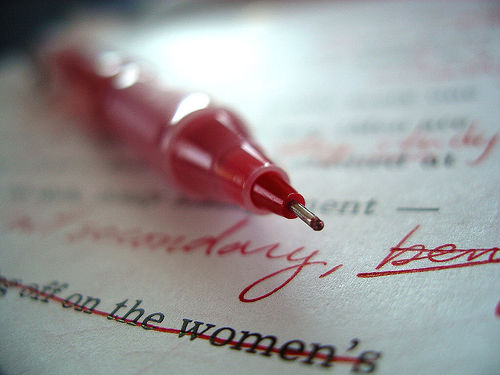
Seeing your own writing for what it really is can be the most difficult phase in the process from writing to publishing. If you are like most writers, you probably think that it’s terrible or brilliant; underdone or overdone. Writers see their own work with a lot of emotions, and that’s exactly what’s getting in the way between them and the clear picture of their weaknesses and strengths.
If you want to be a professional editor, you need to find a way to make an honest approach to your writing. The five tips elaborated in this article will help you accomplish that!
1. Your instincts are important!
People are very selective about the things they focus their attention to in a specific moment. The writer’s brain is just the same – it is choosing the aspects it wants to critique and neglects the whole picture.
If a little voice in your head is telling you that you are not approaching the self-editing process just right, another voice probably goes: ’maybe it’s okay, so I'll just ignore my instincts’. That is the easiest way to miss delivering what you are capable of! Don’t play it safe and listen to your instincts. If something is telling you that the last third of your book isn’t as good as it’s supposed to be, it will be hard to rewrite it, but you will be happy you did that when you achieve better results.
2. Write down the criticism!
If you feel that your main character doesn’t appear strong and impressionable while you are reading, then you have made the first step towards self-editing. Don’t sweep this issue aside, and write down your critique so you won’t ‘forget’ it. Write down the strengths and weaknesses of the manuscript, and then write down the steps you need to take in order to improve it. Putting your own critique in print will make it un-ignorable and clear.
3. Don’t be scared of deleting!
When you start writing passionately, you get carried away and write more than necessary. Deleting is not a way of breaking down the story or taking away from it. It is a brave act that sets a strong foundation for expansion of the story, and makes room for more great things to happen. If you are having doubts about a line or a scene, don’t even look at it again and get rid of it completely.
It’s wise to save it in another document just for reference, but your manuscript needs to be free of any doubts – you must be completely certain that it’s powerful and engaging.
If you start with a blank slate, you may find out that the story was right the first time. If that’s the case, you will easily get the previous version back. However, you may also discover something new and better, which is why you should be passionate about deleting just as you are about writing.
4. Ask for an opinion from a trusted partner!
If it’s hard for you to see your own writing with an editing eye, you should ask a reader to help. This should be a person you trust, so you will get an honest and specific critique. Ask pointed questions about the characters and storyline. If you notice that your critique partner points out the same issues you were having doubts about, then you have a clear indicator that revision is required.
Don’t forget that readers tend to make critiques from their own perspective, so you shouldn’t be afraid to disagree if you are 100% confident about some aspects of your story.
5. Step away and come back with a fresh editing eye!
You have surely heard this tip before: you need to give yourself some time before you approach the work with an editing eye. Giving yourself a break doesn’t mean that you are lazy. Although it can be difficult to step away from the work after you finished writing and stop thinking about that, it is the first self-editing step you should take.
When you return to the manuscript, you will be able to see it from a reader’s perspective and you will instantly know what’s wrong with it.
Conclusion:
Self-editing should not be neglected Even a bad story can be made engaging with good self-editing, but a great story could be ruined without proper revisions. The editing process is hard work, but you should approach it without being afraid that you might s/ee something you won’t like. Self-editing will help you grow as a writer, so be brave and brutally honest with yourself during this phase!

